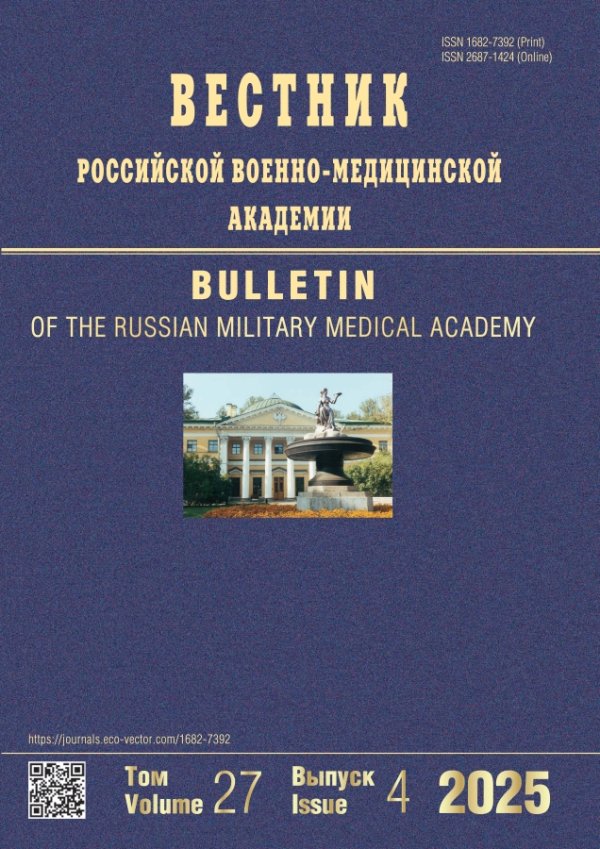Improving revision operations for restoration of the anterior cruciate ligament of the knee joint in military personnel
- Authors: Khominets V.V.1, Rikun O.V.1, Grankin A.S.1, Fedorov R.A.1, Fedotov A.O.1, Bazarov I.S.1, Konokotin D.A.1
-
Affiliations:
- Military medical academy of S.M. Kirov
- Issue: Vol 22, No 4 (2020)
- Pages: 201-207
- Section: Reviews
- URL: https://journals.rcsi.science/1682-7392/article/view/62829
- DOI: https://doi.org/10.17816/brmma62829
- ID: 62829
Cite item
Abstract
The analysis of foreign and domestic scientific publications of recent years, devoted to the problem of revision reconstructions of the anterior cruciate ligament of the knee joint in young and middle-aged patients with high functional demands. The key directions for improving the treatment of this category of patients have been determined. It was found that the main trend in the improvement of revision reconstructions of the anterior cruciate ligament of the knee in patients with high functional demands, which primarily include professional athletes and military personnel, is the desire for enhanced stabilization of the joint by eliminating residual, primarily rotational instability and increasing protection the main graft from high stress overload. Of particular importance is a strictly individual approach to the choice of the method of revision reconstruction of the anterior cruciate ligament, which makes it possible to implement the principles underlying the primary plastic of the ligament. The solution of these two problems requires, firstly, a more detailed examination of patients in order to identify factors of increased risk for the development of recurrent joint instability, which must be eliminated during surgical treatment. Secondly, the strict anatomical nature of restoration, and more often reconstruction, of the main and auxiliary functionally incompetent stabilizing structures of the joint against an unfavorable anatomical background caused by previous operations in the form of bone defects and deformities of the condyles with destruction of hyaline cartilage and previously resected menisci. Third, the use of reinforced grafts of increased strength for the reconstruction of the anterior cruciate ligament, as the main structure that stabilizes the joint. Moreover, such reinforcement can be direct, by strengthening the cruciate ligament graft directly, or indirectly, by strengthening the anterolateral part of the joint. The most appropriate is a combination of these two directions in order to obtain the maximum positive effect. Promising options for extra-articular reinforcement today are anatomical reconstruction of the anterolateral ligament and lateral extra-articular tenodesis of the iliotibial tract as part of the anterolateral joint complex. This makes it possible to compensate for the forced resections of the menisci and, without correction, at least at the first revision, the increased posterior inclination of the articular surface of the tibial condyles. The main advantages of these operations in combination with the reconstruction of the anterior cruciate ligament are their proven efficiency, versatility, technical simplicity and availability, which are of particular importance for the introduction into wide clinical practice of trauma departments of military hospitals.
Full Text
##article.viewOnOriginalSite##About the authors
V. V. Khominets
Military medical academy of S.M. Kirov
Author for correspondence.
Email: vmeda-nio@mil.ru
Russian Federation, Saint Petersburg
O. V. Rikun
Military medical academy of S.M. Kirov
Email: vmeda-nio@mil.ru
Russian Federation, Saint Petersburg
A. S. Grankin
Military medical academy of S.M. Kirov
Email: vmeda-nio@mil.ru
Russian Federation, Saint Petersburg
R. A. Fedorov
Military medical academy of S.M. Kirov
Email: vmeda-nio@mil.ru
Russian Federation, Saint Petersburg
A. O. Fedotov
Military medical academy of S.M. Kirov
Email: vmeda-nio@mil.ru
Russian Federation, Saint Petersburg
I. S. Bazarov
Military medical academy of S.M. Kirov
Email: vmeda-nio@mil.ru
Russian Federation, Saint Petersburg
D. A. Konokotin
Military medical academy of S.M. Kirov
Email: vmeda-nio@mil.ru
Russian Federation, Saint Petersburg
References
Supplementary files







